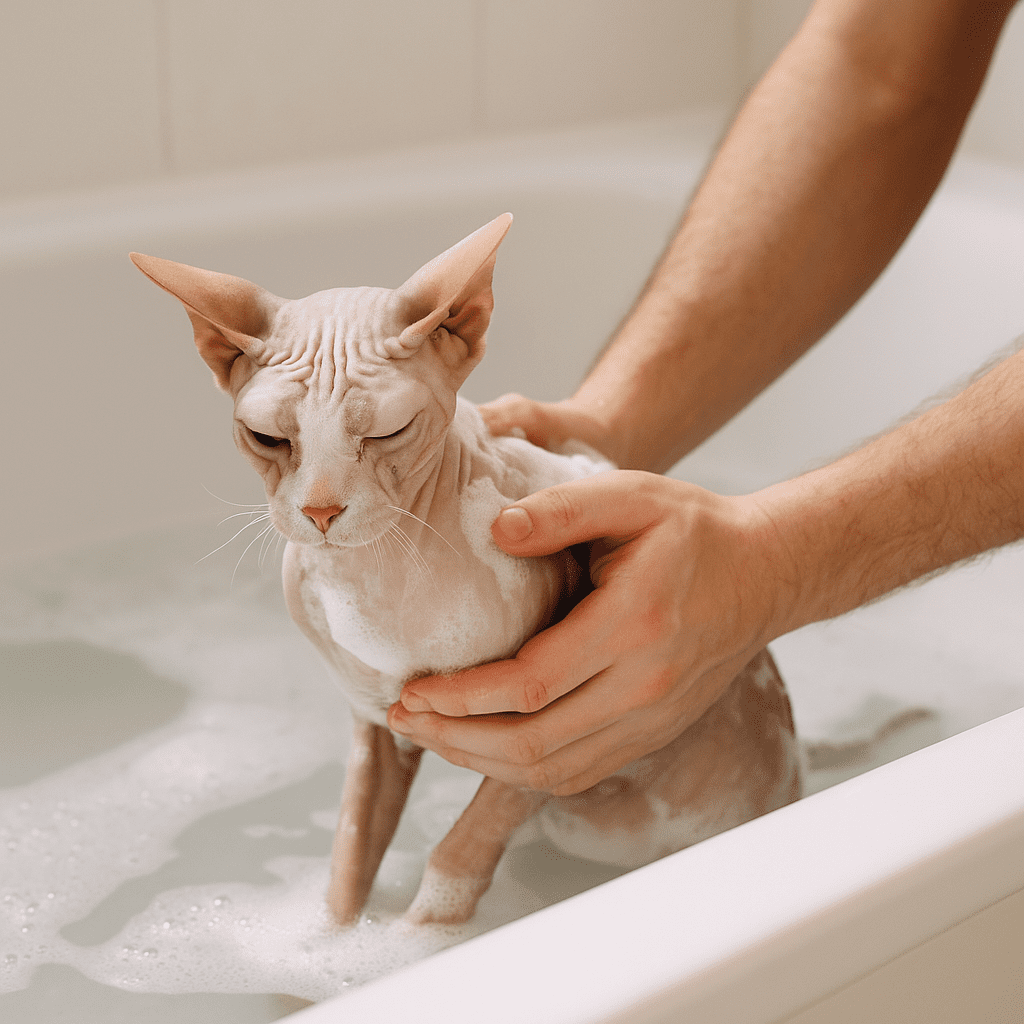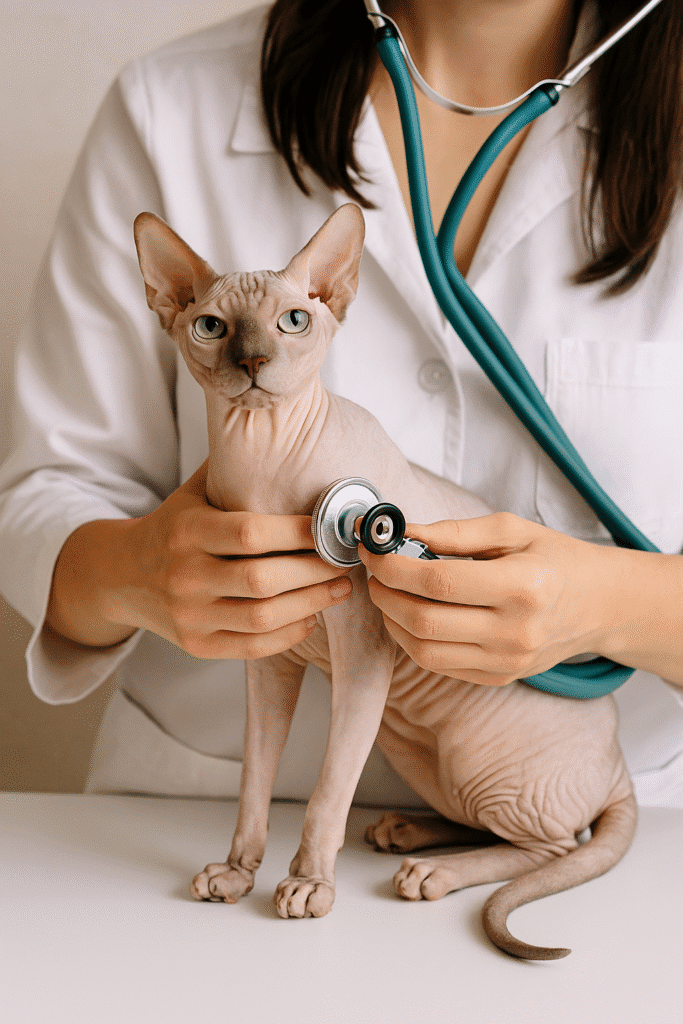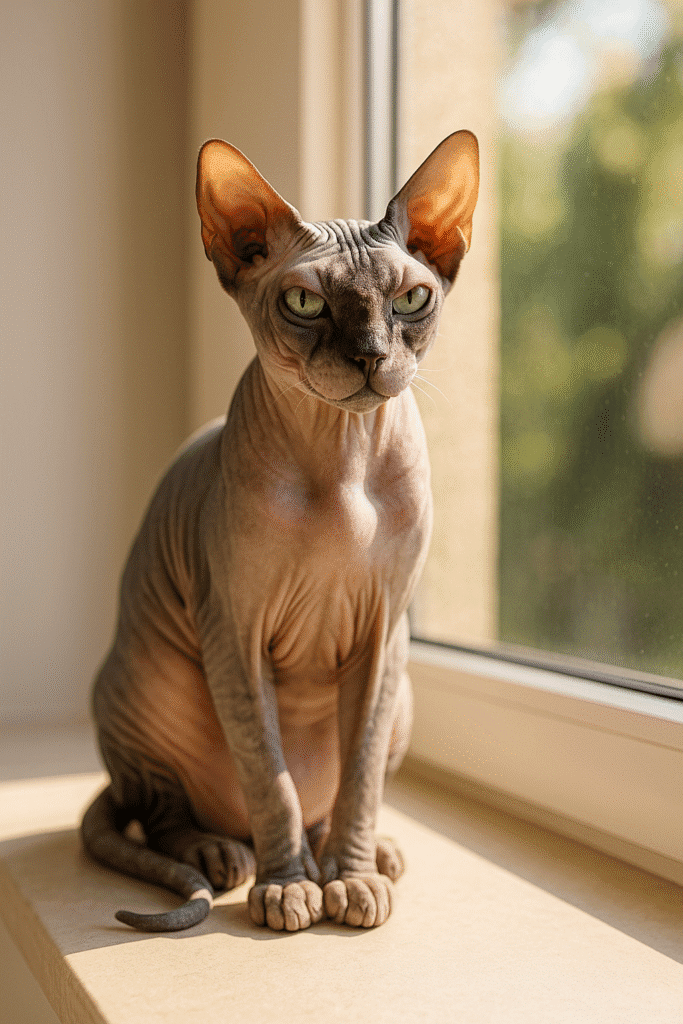Sphynx Cats: Unique Traits, Care Needs & Health Tips
Summary: The Sphynx cat is one of the most unique and recognizable cat breeds in the world. Known for their hairless appearance, affectionate personality, and playful nature, Sphynx cats require specialized care to stay healthy. This guide covers their distinct traits, daily care needs, and essential health tips to ensure your Sphynx thrives.
Introduction: The Allure of the Sphynx Cat
The Sphynx cat is instantly recognizable due to its lack of fur and striking, wrinkled skin. But beyond appearance, these cats are known for being affectionate, curious, and highly social. They bond closely with their families and are often described as “dog-like” because they enjoy following their owners around. In this comprehensive guide, we’ll explore the unique traits, care requirements, and health tips every Sphynx cat owner should know.

Unique Traits of Sphynx Cats
1. Hairless but Not Maintenance-Free
Although they lack a typical fur coat, Sphynx cats are not completely maintenance-free. Their skin produces natural oils that would normally be absorbed by fur, meaning they require regular bathing to prevent buildup. Their exposed skin also makes them sensitive to temperature changes.
2. Playful and Energetic
Sphynx cats are extremely active and love to climb, jump, and play. They need plenty of interactive toys and vertical spaces such as cat trees. Their playful nature makes them great companions for households with children or other pets.
3. Affectionate and People-Oriented
Often referred to as “lap cats,” Sphynx cats crave constant attention and thrive on human companionship. They are known to greet their owners at the door, follow them around the house, and even sleep under the covers for warmth.
Care Needs of the Sphynx Cat
1. Regular Bathing
Because of their lack of fur, Sphynx cats must be bathed every one to two weeks to remove oil buildup and prevent skin irritation. Use a gentle, pet-safe shampoo and ensure the cat is dried thoroughly to avoid chills.
2. Skin and Sun Protection
Their skin can be prone to sunburn if exposed for long periods. If your cat enjoys sunbathing, ensure they have access to shaded areas or apply vet-approved sun protection for pets.
3. Warmth and Comfort
Sphynx cats are sensitive to cold temperatures. Provide them with cozy blankets, heated cat beds, or warm clothing in cooler months. Many Sphynx cats love curling up with their owners for body heat.
4. Ear Cleaning and Hygiene
Without fur to protect their ears, wax and dirt can accumulate quickly. Weekly ear cleaning is essential to prevent infections. Additionally, their nails need regular trimming to avoid scratching delicate skin.
Health Tips for Sphynx Cats
1. Balanced Nutrition
Sphynx cats have a high metabolism, partly because they need extra energy to regulate body temperature. Choose a high-quality, protein-rich cat food and monitor portion sizes to maintain a healthy weight.
2. Regular Veterinary Checkups
Due to their unique physiology, Sphynx cats are more susceptible to certain health conditions, including heart disease such as hypertrophic cardiomyopathy (HCM). Regular checkups and heart screenings are recommended.
3. Monitor for Skin Issues
Watch for signs of rashes, fungal infections, or dryness. Proper bathing routines and vet-approved moisturizers can help manage skin health. If you notice persistent irritation, consult a veterinarian promptly.
4. Dental Care
Sphynx cats, like many breeds, benefit from regular dental care. Brushing with cat-safe toothpaste or providing dental treats can help prevent gum disease and bad breath.

FAQs About Sphynx Cats
Are Sphynx cats hypoallergenic?
No. Although they lack fur, Sphynx cats still produce allergens in their saliva and skin oils. People with cat allergies may still react to them.
Do Sphynx cats get cold easily?
Yes. Because of their lack of fur, Sphynx cats are very sensitive to temperature changes. Owners must provide warmth, especially in winter.
How often should a Sphynx cat be bathed?
Most Sphynx cats require a bath every 1–2 weeks to manage oil buildup on their skin.
What health problems are common in Sphynx cats?
Hypertrophic cardiomyopathy (HCM) is a concern, along with skin issues and dental problems. Regular veterinary care is essential.
Conclusion
The Sphynx cat is more than just a striking, hairless feline—it’s a playful, affectionate, and loving companion. While they do require special care, their charming personality and loyalty make them one of the most rewarding breeds to own. By following proper grooming routines, maintaining their health, and providing warmth, you can ensure your Sphynx cat lives a long, happy, and healthy life.
Call to Action: Want to explore more breeds like the Sphynx? Check out our guide on Maine Coon Cats and Persian Cats for deeper insights.

